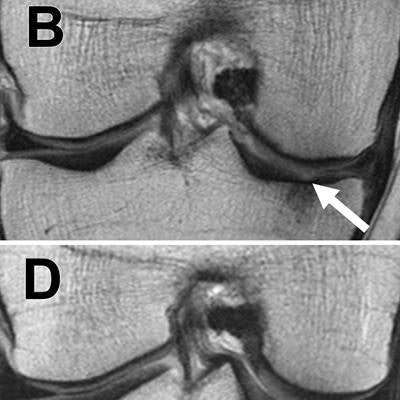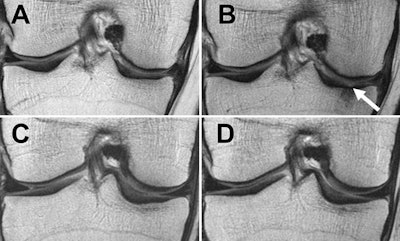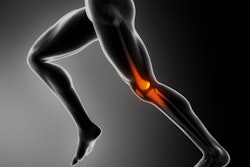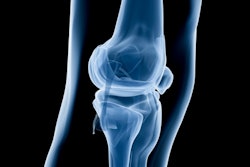
Knee cartilage degeneration from osteoarthritis can be slowed in obese people who lose a substantial amount of weight, but only if diet is a component of the weight-loss regimen, according to research presented on November 28 at the RSNA 2017 meeting.
Researchers from the University of California, San Francisco (UCSF) used MRI to quantify osteoarthritis in 760 obese women with knee osteoarthritis or risk factors for the disease. Over the eight-year study, they found that degeneration of the knee cartilage could only be slowed down significantly through diet and exercise or diet alone.
"These results add to the hypothesis that solely exercise as a regimen in order to lose weight in overweight and obese adults may not be as beneficial to the knee joint as weight loss regimens involving diet," said lead author Dr. Alexandra Gersing in a statement from the RSNA.
 Baseline and follow-up MRIs of the right knee in two women with osteoarthritis, one who lost no weight (A, B) and one who lost weight (C, D). Images courtesy of RSNA.
Baseline and follow-up MRIs of the right knee in two women with osteoarthritis, one who lost no weight (A, B) and one who lost weight (C, D). Images courtesy of RSNA.Obesity is known to be a major risk factor for osteoarthritis. The degenerative joint disease commonly affects the knee, and in many cases, the condition progresses until total knee replacement becomes necessary. Cartilage loss can't be reversed, so it's important for people at risk of osteoarthritis or who have early signs of the disease to take steps to slow the degeneration of cartilage, according to the researchers.
They investigated cartilage degeneration and joint abnormalities in 760 men and women from the Osteoarthritis Initiative research study who had a body mass index greater than 25. All patients had mild to moderate osteoarthritis or risk factors for the disease. Of the 760 patients, 380 had lost weight and were placed into a weight-loss group of patients. The other 380 patients had not lost weight and were considered to be the control group for the UCSF study. The researchers then further divided the weight-loss patient group by the method used to achieve the weight loss -- diet alone, exercise alone, and diet and exercise.
MRI was used to quantify knee osteoarthritis at the beginning of the study, as well as 48 months and 96 months later. The patients who lost weight had significantly lower cartilage degeneration than the control group over the 96 months, the researchers found. However, significantly lower cartilage degeneration was only found among patients who lost weight through diet and exercise or diet alone. Patients who only exercised did lose as much weight as those who only dieted or those who also exercised, but they did not have any significant difference in cartilage degeneration compared with the group of patients who did not lose weight.





















